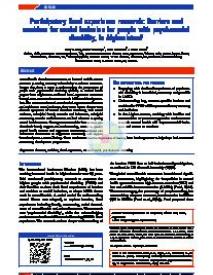Participatory lived experience research : Barriers and enablers for social inclusion for people with psychosocial disability, in Afghanistan?
Mental health disorders are common in low and middle-income countries (LMICs), creating vulnerability to adverse outcomes. Despite this, there is a gap in understanding the perspectives of people with psychosocial disability (PPSD). A mental health project from Afghanistan collected lived experience narratives through semi-structured interviews with PPSD and family members.
The interviews focused on individual experiences of barriers and enablers to social inclusion. Four main barrier themes were elicited: symptoms of mental disorders interfering with social inclusion, unhelpful family attitudes and behaviour, unhelpful community attitudes and behaviours and lack of access to quality mental health services. Three prominent enabler themes were also identified: family support and understanding, access to quality mental health services and supportive community attitudes and behaviours. Connection to supportive community and support from family was a critical finding. These results reinforce the importance of hearing from lived experience to help shape both service and community development programmes.
KEY IMPLICATIONS FOR PRACTICE
Engaging with the lived experience of psychosocial disability is beneficial, necessary and possible in LMICs
Understanding key, context-specific barriers and enablers for PPSD will improve wellness, recovery and inclusion
In the Afghan context, working with families and communities to promote supportive environments towards mental health will improve social inclusion and access to services.
In: Intervention: Journal of Mental Health and Psychosocial Support in Conflict Affected Areas, ISSN 1571-8883 | 16 | 3 | September - December | 222-230
http://doi.org/10.4103/INTV.INTV_39_18
http://www.interventionjournal.org/article.asp?issn=1571-8883;year=2018;volume=16;issue=3;spage=222;epage=230;aulast=Allan;type=0


